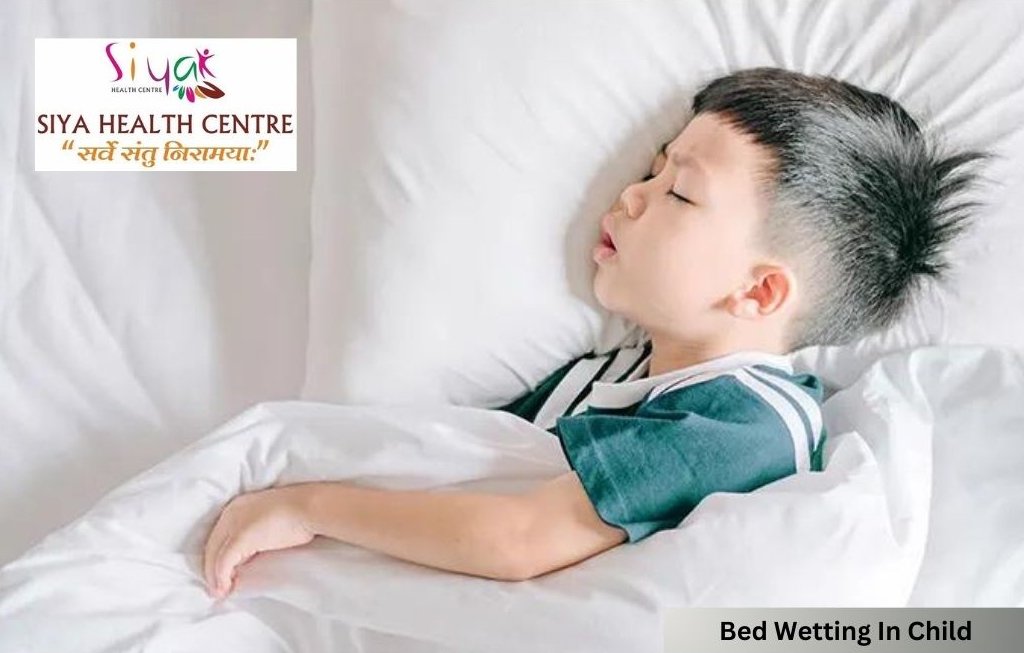BED WETTING IN KIDS
Best Doctor for Bed Wetting In Kids at Siya Health Center, Bedwetting, also called nocturnal enuresis, happens when children pee in their sleep without meaning to. It’s common in kids aged 5 and older, though younger children can also experience it. This can be upsetting for both kids and parents, causing feelings of embarrassment and frustration. Dr. Ratnesh Khare, a trusted pediatrician at Siya Health Care in Indore, specializes in helping families manage and treat bedwetting. He knows that bedwetting is often a normal part of growing up and can happen because of things like genes, not fully developed bladder control, or feeling stressed. While many kids stop wetting the bed as they get older without needing medical help, understanding why it happens and finding ways to help can make a big difference. Dr. Khare creates personalized plans to help each child, making sure to take care of their specific needs. If your child wets the bed and you’re worried, talking to Dr. Khare can give you the right support and guidance.

Signs of Bedwetting in Kids:
When children wet the bed, these are the signs to watch for:
Wetting the Bed While Asleep
The main sign is when a child pees in bed without meaning to. Dr. Ratnesh Khare, a top pediatrician in Indore, suggests parents keep track of how often and when this happens.
Trouble Sleeping
Kids who wet the bed might wake up often at night, which can make them feel tired during the day.
Skin Irritation
Being in wet clothes all night can irritate the skin around their private parts. Dr. Khare can help treat any rashes or irritation at Siya Health Care.
Emotional Upset
Bedwetting can make kids feel embarrassed, ashamed, or anxious. Dr. Khare gives caring support to help kids with these feelings.
If your child shows these signs of bedwetting, it’s a good idea to talk to Dr. Khare for advice and support tailored to your child’s needs.
Book Your Consultation Today Child Specialist in Indore– Dr. Ratnesh Khare
Causes of Bed Wetting in Kids:
Several reasons can explain why children wet the bed:
- Genetics: Bedwetting often runs in families. If parents wet the bed as kids, their child is more likely to do the same. Dr. Ratnesh Khare at Siya Health Care looks at family history to understand bedwetting cases.
- Bladder Development: Some kids have bladders that haven’t fully matured yet, making it hard to hold urine all night.
- Deep Sleep: Children who sleep deeply may not wake up when their bladder is full, leading to bedwetting.
- Hormones: A lack of a hormone called antidiuretic hormone (ADH), which reduces urine production at night, can also play a role.
- Stress and Anxiety: Kids can wet the bed because they’re feeling stressed or anxious, like starting school or dealing with changes at home. Dr. Khare considers these factors as part of a whole approach to treatment at Siya Health Care.
Understanding these reasons can help parents and Dr. Khare finds the best ways to help kids stop wetting the bed and feel more comfortable.
Diagnosis of Bed Wetting in Kids:
Medical History
Dr. Khare asks detailed questions about the child's health, including family history and any recent changes in their life. This helps us understand what might be causing the bedwetting.
Physical Exam
A thorough check-up helps Dr. Khare see if any medical issues could be making the child wet the bed.
Urinalysis
This test checks the child's urine for infections or other problems that might be linked to bedwetting.
Bladder Diary
Keeping track of when and how much the child pees can show patterns that help Dr. Khare understand what's causing the bedwetting.
By using these tools, Dr. Khare can find out why the child is wetting the bed and choose the best way to help them stop. If your child wets the bed and you're concerned, talking to Dr. Khare can give you the answers and support you need.
Treatment of Bed Wetting in Kids
Behavioral Strategies
Techniques such as scheduled nighttime awakenings and bladder training exercises can help improve bladder control. Dr. Ratnesh Khare at Siya Health Care tailors these strategies to each child's needs.
Moisture Alarms
Bed wetting alarms that detect moisture and wake the child can be effective in conditioning the child to wake up when they need to urinate.
Medication
In some cases, medication may be prescribed to reduce urine production at night or improve bladder capacity. Dr. Khare provides careful guidance on the use of medication when necessary. Counseling: Addressing any emotional or psychological factors through counseling can help reduce bed-wetting incidents. Dr. Khare offers supportive counseling services at Siya Health Care.
Fluid Management
Managing fluid intake in the evening can help reduce the likelihood of bed wetting. Dr. Khare advises on appropriate fluid management techniques.
Bedwetting in children is a common and usually temporary issue that can be well managed with the right approach. Dr. Ratnesh Khare, a highly regarded pediatrician at Siya Health Care in Indore, offers thorough care tailored to each child and family. He focuses on both the physical and emotional aspects of bedwetting, helping children overcome this challenge and feel more confident. With patience, support, and the right medical attention, most children can outgrow bedwetting successfully.
Frequently Asked Questions
Bedwetting, or nocturnal enuresis, is the involuntary release of urine during sleep in children over the age of 5. It can be distressing but is often a natural part of development. Dr. Ratnesh Khare at Siya Health Care emphasizes that this condition is common and manageable with proper care.
Involuntary Urination: The primary symptom is the unintentional release of urine during sleep.
Disrupted Sleep: Frequent waking due to wetting the bed can lead to disrupted sleep and daytime fatigue. Skin Irritation: Prolonged exposure to urine can cause rashes or irritation. Emotional Distress: Children may feel embarrassed or anxious about bed wetting. Dr. Ratnesh Khare at Siya Health Care addresses both physical and emotional symptoms.
Parents should consult a doctor if bed wetting persists beyond age 7, occurs frequently after a period of dryness, or is accompanied by other symptoms like pain or unusual urine. Dr. Ratnesh Khare at Siya Health Care provides expert evaluation and care for these cases.
While it cannot always be prevented, maintaining a consistent bedtime routine, managing evening fluid intake, and addressing any stress or anxiety can help reduce incidents. Dr. Ratnesh Khare at Siya Health Care offers preventive strategies to support parents and children.
Parents should offer reassurance and avoid punishment. Using protective bedding, encouraging bathroom visits before bed, and seeking medical advice if needed are important steps. Dr. Ratnesh Khare at Siya Health Care emphasizes the importance of a supportive and understanding approach.
Dr. Ratnesh Khare, the best pediatrician in Indore, provides comprehensive care and support at Siya Health Care, helping families manage bedwetting with compassion and expertise.

